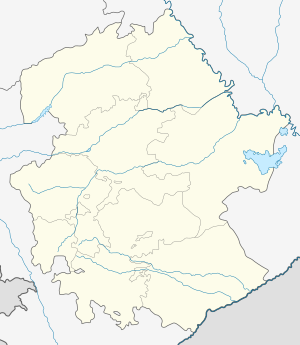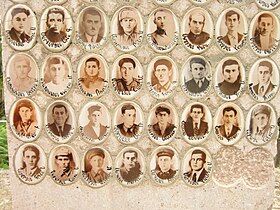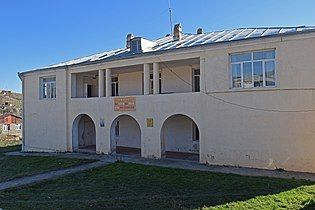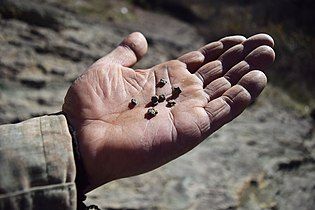Astghashen
Astghashen / Dashbulag
Աստղաշեն / Դաշբուլաղ | |
|---|---|
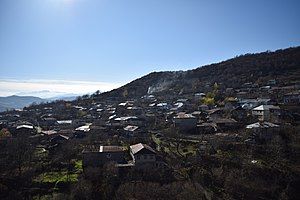 | |
| Coordinates: 39°55′37″N 46°42′17″E / 39.92694°N 46.70472°E | |
| Country | |
| • District | Khojaly |
| Elevation | 772 m (2,533 ft) |
| Population (2015)[1] | |
• Total | 507 |
| Time zone | UTC+4 (AZT) |
Astghashen (Armenian: Աստղաշեն) or Dashbulag (Armenian: Դաշբուլաղ; Azerbaijani: Daşbulaq) is a village in the region of Nagorno-Karabakh, in the Khojaly District of Azerbaijan. The village is famous for its unique star-shaped stones, which the village derives its name from.[2] Until 2023 it was controlled by the breakaway Republic of Artsakh. The village had an ethnic Armenian-majority population[3] until the exodus of the Armenian population of Nagorno-Karabakh following the 2023 Azerbaijani offensive in Nagorno-Karabakh.[4]
Toponymy
[edit]The village was historically known as Karaghbyur (Armenian: Քարաղբյուր).[5] The name Astghashen means "village of stars", with the word Astgh (Armenian: Աստղ) meaning "star" in Armenian, referring to the famous star-shaped fossils of the village.
History
[edit]The village is known for its star-shaped fossils. The fossils originate from small marine animals that lived in the Tethys Ocean that covered the area millions of years ago. There are also many other types of fossils in the area.[6]
During the Soviet period, the village was a part of the Askeran District in the Nagorno-Karabakh Autonomous Oblast of Azerbaijan SSR. The village has been administered by the Republic of Artsakh as a part of its Askeran Province since the First Nagorno-Karabakh War.
After the 2020 Nagorno-Karabakh war, Artsakh launched the construction of a new settlement for IDPs close to Astghashen, on the road towards the neighboring village of Patara, for people displaced from the villages of Sghnakh, Jraghatsner, Madatashen and Moshkhmhat in the Askeran Province.[7][8][9]
Historical heritage sites
[edit]Historical heritage sites in and around the village include burial sites from the 2nd–1st millennia BCE, a 14th-century tomb about 4 km southwest of the village, St. George's Church (Armenian: Սուրբ Գևորգ եկեղեցի, romanized: Surb Gevorg Yekeghetsi) built in 1898, with two 16th/17th-century khachkars, and a spring monument from 1930.[10][1]
Economy and culture
[edit]The population is mainly engaged in agriculture and animal husbandry. As of 2015, the village has a municipal building, a secondary school, a house of culture, two shops, and a medical centre. The Astghashen Art School is also located in the village.[1]
Demographics
[edit]The village had 520 inhabitants in 2005,[11] and 507 inhabitants in 2015.[1]
Gallery
[edit]-
St. George's Church in Astghashen
-
Inside St. George's Church
-
Monument to the victims of the Great Patriotic War (WWII)
-
Closeup of monument to the victims of the Great Patriotic War (WWII)
-
Municipal building in Astghashen
-
School entrance
-
The famous star-shaped fossils of the village
References
[edit]- ^ a b c d Hakob Ghahramanyan. "Directory of socio-economic characteristics of NKR administrative-territorial units (2015)".
- ^ Khachatrian, Vahagn (2023-08-10). "Astghashen: Mysterious Village of Artsakh". The Armenian Weekly. Retrieved 2023-11-03.
- ^ Андрей Зубов. "Андрей Зубов. Карабах: Мир и Война". drugoivzgliad.com.
- ^ Sauer, Pjotr (2 October 2023). "'It's a ghost town': UN arrives in Nagorno-Karabakh to find ethnic Armenians have fled". The Guardian. ISSN 0261-3077. Retrieved 9 November 2023.
- ^ Վահրամ Բալայան (2002). Արցախի պատմությունը հնադարից մինչեւ մեր օրերը.
- ^ "Mysteries of Astghashen". Armenian Geographic.
- ^ Armenpress (2021-02-16). "Construction of new residential settlement for displaced citizens launched in Artsakh".
- ^ Siranush Ghazanchyan (2021-02-13). "New settlement being established in Artsakh's Askeran region". Public Radio of Armenia.
- ^ Tirayr Muradyan & Saro Baghdasaryan (2021-07-12). "New Artsakh Village to House IDPs". hetq.am.
- ^ Kiesling, Brady; Kojian, Raffi (2019). Rediscovering Armenia: An in-depth inventory of villages and monuments in Armenia and Artsakh (3rd ed.). Armeniapedia Publishing.
- ^ "The Results of the 2005 Census of the Nagorno-Karabakh Republic" (PDF). National Statistic Service of the Republic of Artsakh.


